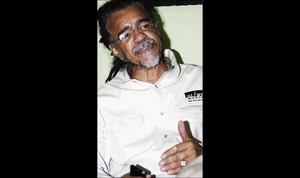
After topping the 1967 Festival Song Contest with Baba Boom as part of The Jamaicans, Tommy Cowan gradually took to the administrative and production side of the music business. And that eventually took him to the 1980 Zimbabwe Independence Concert with Bob Marley and the Wailers. It was, however, a connection that went way back.
Cowan told The Sunday Gleaner, "I knew Bob from the early days of 1964. I knew Rita even earlier. I would carry her books from school. When Bob recorded, I think in 1965-66 at Coxsone Dodd's, we were there also. We did some shows together at Ward Theatre and UWI. We recorded Chain Gang, Waited So Long and the song Jamaica at Coxone Dodd's that time."
Tuff Gong
Over a decade later, Cowan carried another sort of book for Bob Marley, his songbook, if you will. "In 1976, Bob came to me with the problem that his music was not getting fair play and attention. I listened to the music he had on tape and chose Road Block, to be followed by Natty Dread. The two songs became number one. He then invited me to join him at Tuff Gong, bringing my artistes Junior Tucker, Israel Vibration and Ras Michael along," Cowan said. But there was an interruption, as "Bob got shot, went off to England".
The link was not broken, though, as "Claudie Massop approached me to put together a concert for Bob's homecoming, so we invented the 'One Love Peace Concert'. I became the marketing manager for Tuff Gong and toured Africa and Europe with him".
Of course, touring Africa included the historic Zimbabwe Independence concert and Cowan remembers "the visit of the soldiers at Hope Road who asked that Bob would honour the people of Rhodesia by performing at the independence celebrations (saying) 'when we were losing the battle, it was Bob's music that inspired the victory of the war'. I was given the task of producing this musical event, building the stage, hiring labourers etc."
The concert had its legendary chaotic moments. Cowan said "on Bob's third song, I heard a commotion over the back fence of the stadium which I went to investigate and to my surprise I saw thousands of black men heading towards the gate. The police started to throw teargas, some got in my eyes and I ran back to the stage. "I took a wet towel and covered the face of young Ziggy and the show came to a halt. We learnt then that it was the prisoners of war who broke out of jail to see their hero Bob Marley. When it was time to resume, there was no I Three, someone took them away. On resumption, Bob sang Zimbabwe and Africa Unite to the lowering of the Rhodesian flag and hoisting of the Zimbabwe flag. We eventually caught up with the I Three later on, Bob jokingly said 'now I know who is the true revolutionaries'."
Gifted
Cowan assessed Bob Marley as gifted, saying that he had a lot of common sense, used the simple things to send a strong message, loved the poor and oppressed, was a shrewd businessman, a man of vision, a soldier with music as his weapon and a family man.
Naturally, Marley's death in 1981 had a deep impact on Cowan, as "I was the marketing manager of Tuff Gong and Bob had a big vision not only for the music, but for the country".
"He wanted to buy large plots of land to teach and develop farming. He wanted to go into the oil business - coconut-oil business. He had bought his first two sewing machines to build Tuff Gong school uniforms, which would be sold at a no-profit level to make it affordable to all schoolchildren in Jamaica," Cowan said.
"He understood his dream. He understood purpose and the power of man. He used the vision of his heart to replace the limitations of his eyes and I was right there with him. One day he drew a circle on the ground and put a line across it and said 'this side is you, this side is me, equal respect'."